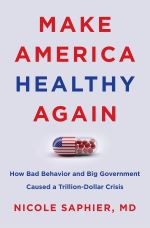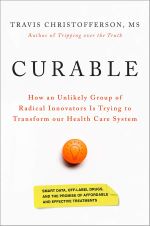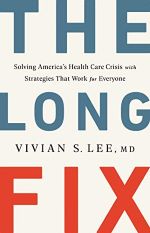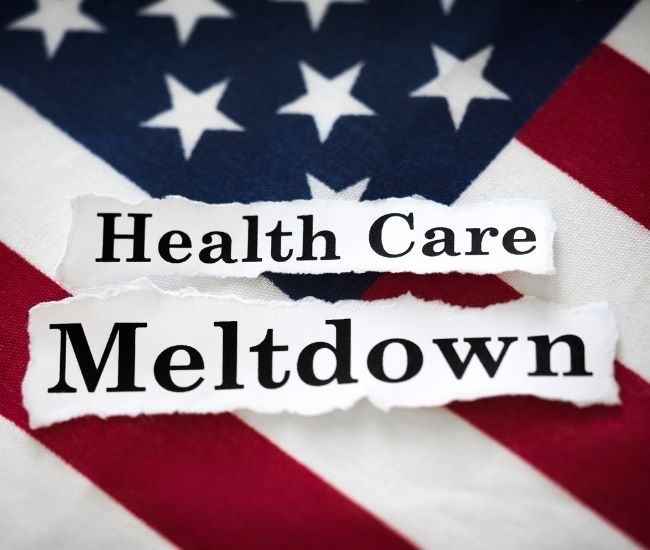https://booktrib.com/wp-content/uploads/2020/11/us-healthcare-crisis-solutions-listicle.jpg
Regardless of where you stand on the political spectrum, most of us agree: America’s healthcare system is broken, the cost of care has spiraled out of control, and Americans are sicker than we have ever been — and that was before Covid.
Who is at fault is complicated; patients, employers, healthcare providers, insurance companies, pharmaceutical companies, medical tech manufacturers, policymakers — all own a piece of the problem. What’s clear is that we can’t continue along this trajectory for long before the entire system melts down. The key is to identify and make the changes required before it’s too late. Systemic change is an overwhelming mission to tackle, and it will take all of us — individuals and organizations — to turn it around.
Here just a few of the many insightful books out there, each from a different perspective, that address some of the key issues at the heart of the crisis, along with various potential solutions.
 The Political Determinants of Health by Daniel E. Dawes
The Political Determinants of Health by Daniel E. Dawes
The current pandemic has put into stark contrast the inequalities inherent in American health care. These are not just issues of access and affordability, or the biases of health care workers and medical research. The problem, according to attorney, scholar and health policy expert Daniel Dawes, goes even deeper than that. Underlying social conditions in our country are generating worsening health outcomes for many communities. Dawes argues that poor environmental conditions, inadequate transportation, unsafe neighborhoods and lack of healthy food options are determinants that impact the equitable distribution of health opportunities and resources. Dawes considers both the policies we think of as “health policy” and those that we don’t, and provides a multidisciplinary framework for addressing systemic barriers to health among underserved and marginalized communities.
Amazon | Barnes & Noble | IndieBound | Bookshop
 Make America Healthy Again: How Bad Behavior and Big Government Caused a Trillion-Dollar Crisis by Nicole Saphier, M.D.
Make America Healthy Again: How Bad Behavior and Big Government Caused a Trillion-Dollar Crisis by Nicole Saphier, M.D.
Dr. Nicole Saphier, a Memorial Sloan Kettering physician and nationally recognized patient advocate, argues the opposite: that it is the patient, not the system, that must change first. Americans are notoriously unhealthy — we eat too much, drink too much and sit too much. When roughly 80 percent of cardiovascular disease and 40 percent of all cancer cases could be prevented by simple lifestyle changes, our healthcare system is saddled with the costs of fixing illnesses rather than preventing them in the first place. We don’t need socialized medicine, Saphier argues; we need to take better care of ourselves. In order to do that, the industry needs to stop incentivizing bad health decisions and focus on personal responsibility. The national health crisis will not be solved by bureaucrats and policymakers. In short, it’s up to the American people to make America healthy again.
Amazon | Barnes & Noble | IndieBound | Bookshop
 Emotional Dimensions of Healthcare by David Woodlock
Emotional Dimensions of Healthcare by David Woodlock
Okay, okay, sheesh— we all know what we should be doing to be healthier; so why don’t we actually do it? Well, for one thing, we could use a more holistic kind of support from our healthcare providers. David Woodlock, the head of an award-winning, not-for-profit human service agency who has also clocked more than 30 years of service in state government, focuses on the connection between mental health and physical health. In this book, Woodlock examines the correlation between our emotions, unhealthy behaviors and poor health outcomes. The combination of chronic stress, adverse childhood experiences, and continued negative social determinants such as exposure to community violence and poverty, can have a devastating impact on anyone’s physical health. But our current approach to health care ignores the emotional component of our well-being. Woodlock provides a prescription for smarter, better health, offering innovative approaches already being tried, as well as surveying promising new ideas yet to be implemented.
Amazon | Barnes & Noble | IndieBound | Bookshop
 Curable: How an Unlikely Group of Radical Innovators Is Trying to Transform Our Health Care System by Travis Christofferson
Curable: How an Unlikely Group of Radical Innovators Is Trying to Transform Our Health Care System by Travis Christofferson
There’s another psychological dimension at play in health care, argues journalist and health care advocate Travis Christofferson. It’s that of cognitive bias. Human perception is based on deeply entrenched patterns of irrational thought, which we attach ourselves to religiously. So how does this implicate the very scientific research and data that doctors rely on to successfully treat their patients? Christofferson explores the links between the revolutionary baseball analytics of Moneyball; Nobel Prize-winning psychological research on confirmation bias; maverick economic philosophy; the rise of the clinical trial; cutting-edge treatments routinely overlooked by regulatory bodies; and outdated medical models that prioritize profit over prevention. Fixing our health crisis, Christofferson says, requires reframing the conflict between doctors’ intuition and statistical data, while opening up new ways of using tools already at our disposal to approach the challenge of chronic illness with entirely new methods, many of which cost less and work better. To do so, some healthcare practitioners are turning to smart metrics, slow thinking and an unconventional kind of conventional medicine.
Amazon | Barnes & Noble | IndieBound | Bookshop
 The Long Fix: Solving America’s Health Care Crisis with Strategies That Work for Everyone by Vivian Lee M.D.
The Long Fix: Solving America’s Health Care Crisis with Strategies That Work for Everyone by Vivian Lee M.D.
Physician and health care CEO Vivian Lee argues that the problem with the way medicine is practiced today is not so much the choice of those who practice it, but of those who are paying for it — insurers, employers, the government, individuals — and what’s being paid for. Across the industry, we pay for every procedure, prescription and lab test, whether or not it makes us better. Lee proposes a different system of remuneration and compensation. When doctors, hospitals and pharmaceutical companies are paid to keep people healthy, she argues, care improves and costs decrease. Lee shares examples of how this is being done, from physicians’ practices that prioritize preventative care, to hospitals that adapt lessons from manufacturing plants to make them safer, to healthcare organizations that share online how much care costs and how well each physician is caring for patients. It may not be a quick fix, but Lee presents a concrete action plan for reform — for employers, patients, clinicians and policymakers — to reinvent health care and create a less costly, more efficient and healthier system for all.
Amazon | Barnes & Noble | IndieBound | Bookshop

The Political Determinants of Health by Daniel E. Dawes
The current pandemic has put into stark contrast the inequalities inherent in American health care. These are not just issues of access and affordability, or the biases of health care workers and medical research. The problem, according to attorney, scholar and health policy expert Daniel Dawes, goes even deeper than that. Underlying social conditions in our country are generating worsening health outcomes for many communities. Dawes argues that poor environmental conditions, inadequate transportation, unsafe neighborhoods and lack of healthy food options are determinants that impact the equitable distribution of health opportunities and resources. Dawes considers both the policies we think of as “health policy” and those that we don’t, and provides a multidisciplinary framework for addressing systemic barriers to health among underserved and marginalized communities.

Make America Healthy Again: How Bad Behavior and Big Government Caused a Trillion-Dollar Crisis by Nicole Saphier, M.D.
Dr. Nicole Saphier, a Memorial Sloan Kettering physician and nationally recognized patient advocate, argues the opposite: that it is the patient, not the system, that must change first. Americans are notoriously unhealthy — we eat too much, drink too much and sit too much. When roughly 80 percent of cardiovascular disease and 40 percent of all cancer cases could be prevented by simple lifestyle changes, our healthcare system is saddled with the costs of fixing illnesses rather than preventing them in the first place. We don’t need socialized medicine, Saphier argues; we need to take better care of ourselves. In order to do that, the industry needs to stop incentivizing bad health decisions and focus on personal responsibility. The national health crisis will not be solved by bureaucrats and policymakers. In short, it’s up to the American people to make America healthy again.

Emotional Dimensions of Healthcare by David Woodlock
Okay, okay, sheesh— we all know what we should be doing to be healthier; so why don’t we actually do it? Well, for one thing, we could use a more holistic kind of support from our healthcare providers. David Woodlock, the head of an award-winning, not-for-profit human service agency who has also clocked more than 30 years of service in state government, focuses on the connection between mental health and physical health. In this book, Woodlock examines the correlation between our emotions, unhealthy behaviors and poor health outcomes. The combination of chronic stress, adverse childhood experiences, and continued negative social determinants such as exposure to community violence and poverty, can have a devastating impact on anyone’s physical health. But our current approach to health care ignores the emotional component of our well-being. Woodlock provides a prescription for smarter, better health, offering innovative approaches already being tried, as well as surveying promising new ideas yet to be implemented.

Curable: How an Unlikely Group of Radical Innovators Is Trying to Transform Our Health Care System by Travis Christofferson
There’s another psychological dimension at play in health care, argues journalist and health care advocate Travis Christofferson. It’s that of cognitive bias. Human perception is based on deeply entrenched patterns of irrational thought, which we attach ourselves to religiously. So how does this implicate the very scientific research and data that doctors rely on to successfully treat their patients? Christofferson explores the links between the revolutionary baseball analytics of Moneyball; Nobel Prize-winning psychological research on confirmation bias; maverick economic philosophy; the rise of the clinical trial; cutting-edge treatments routinely overlooked by regulatory bodies; and outdated medical models that prioritize profit over prevention. Fixing our health crisis, Christofferson says, requires reframing the conflict between doctors’ intuition and statistical data, while opening up new ways of using tools already at our disposal to approach the challenge of chronic illness with entirely new methods, many of which cost less and work better. To do so, some healthcare practitioners are turning to smart metrics, slow thinking and an unconventional kind of conventional medicine.

The Long Fix: Solving America's Health Care Crisis with Strategies That Work for Everyone by Vivian Lee M.D.
Physician and health care CEO Vivian Lee argues that the problem with the way medicine is practiced today is not so much the choice of those who practice it, but of those who are paying for it — insurers, employers, the government, individuals — and what’s being paid for. Across the industry, we pay for every procedure, prescription and lab test, whether or not it makes us better. Lee proposes a different system of remuneration and compensation. When doctors, hospitals and pharmaceutical companies are paid to keep people healthy, she argues, care improves and costs decrease. Lee shares examples of how this is being done, from physicians’ practices that prioritize preventative care, to hospitals that adapt lessons from manufacturing plants to make them safer, to healthcare organizations that share online how much care costs and how well each physician is caring for patients. It may not be a quick fix, but Lee presents a concrete action plan for reform — for employers, patients, clinicians and policymakers — to reinvent health care and create a less costly, more efficient and healthier system for all.





